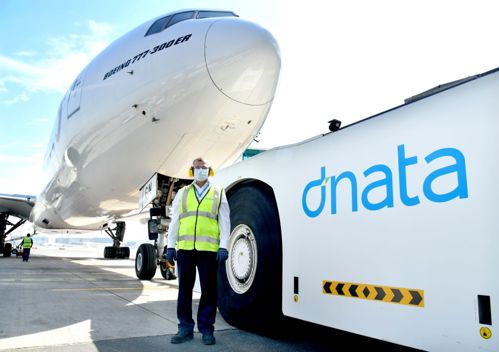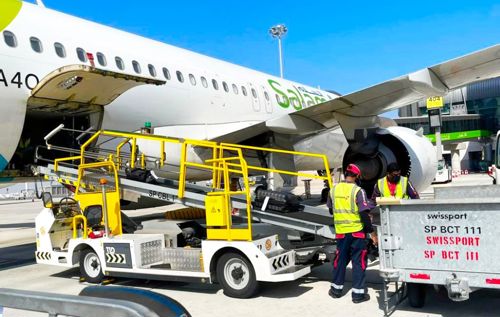
Pre-pandemic, airports in the UAE, particularly Abu Dhabi and Dubai, were busy transport hubs serving passengers flying on important routes such as connecting Europe with Asia and Australia.
When Covid struck and countries closed their borders, passenger numbers plummeted but players quickly pivoted their businesses to keep vital supply chains open.
In Abu Dhabi, Etihad Cargo operated its first passenger freighter flight within 24 hours of passenger services being suspended and a flight schedule was put in place within 48 hours.
The passenger freighters have been instrumental to deliver aid on behalf of the UAE Government aid programmes and deliver vaccines with partners at the HOPE Consortium.
Martin Drew, Senior Vice President Sales and Cargo at Etihad Aviation Group said: “In mid-2020, we reconfigured 5 aircraft for cargo in-cabin loading, and as soon as we introduced cargo in cabin, it immediately supported customers by providing additional capacity on vital lanes.”
In 2021, Etihad Cargo was operating 90% of its pre-Covid network again and tonnage was 27% above 2020, the best results since 2017. Etihad Cargo has operated more than 6,000 passenger freighter flights with an on-time performance of 84% and within three months of its online booking portal being revamped, online bookings increased by 36%.
Drew commented: “Despite the disruptions caused by the Covid-19 pandemic, Etihad Cargo maintained a Delivered As Promised (DAP) rate of 84% last year, demonstrating the punctuality of the UAE’s national freighter fleet against the schedule, as well as its ability to deliver cargo at an agreed time.”
Demand for cargo is still strong and passengers are eager to fly again but global capacity has been cut substantially, and some of this will not return. IATA reports that capacity is down 11% and this is having a direct impact on yields.
Drew said: “This will continue to present a challenge across the global supply chain, and carriers such as Etihad Cargo are working directly with customers and partners to provide required airlift support where needed to address any capacity shortages and minimise the impact this has on overall trade flows.”
Exciting times ahead
In Dubai, demand returned quickly when flight and travel restrictions were lifted, said Jaffar Dawood, Senior Vice President for UAE Airport Operations at dnata. He said the team responded quickly to customer needs and supporting airline customers in reinstating flight operations safely and smoothly. The delayed Expo 2020 gave Dubai a big boost.
He commented: “With the excitement surrounding Dubai Expo 2020, we have witnessed a noticeable increase in passenger and flight volumes. Winter has also brought with it the seasonal increase in traffic and forecasted growth. We expect continued growth as traveller confidence increases.”
Due to the pandemic, dnata, like all businesses, had to look at staff numbers but now the world is opening up again, it is hiring in Dubai.
Dawood said: “We aim to fill vacancies with those highly-trained, former dnata employees, who meet our performance criteria but were displaced due to the significant impact of the pandemic on our business.”

The niche airport
Smaller and lower profile than Dubai or Abu Dhabi, Ras Al Khaimah Airport has ambitious plans to become the gateway of choice and convenience in the UAE. With its pristine beaches and diverse tourist attractions, Ras Al Khaimah’s vision is to serve tourism traffic.
There is also space to develop into a cargo hub and a bridge connecting Asia with the Gulf and further afield in Africa. MRO facilities also provide business opportunities.
The airport told GHI: “With the right mixture of tourism and labour market, coupled with cargo operation utilising RAK Airport, the opportunities for continuous business growth raises confidence in the bright future.”
Much like the rest of the world, Covid dictated how Ras Al Khaimah could recover in 2021, which was a volatile year. Aviation opened up quite suddenly in Q2 on approved routes, leading to a surge in demand until things closed up again.
The airport said: “This led to an instant boom in air travel demand until the middle of May 2021, when new restrictions were imposed by several countries within the Asian subcontinent that supply most of the ex-pat labour force within the UAE and as such have historically always maintained a high yield for carriers operating these routes.”
Agreements kept air corridors open in a fair, though restricted manner, keeping the aviation business alive.
“RAK Airport used this opportunity to its advantage resulting in a massive increase in air traffic during Q4 of 2021, when it successfully handled up to 120% increase in daily movements,” said the airport.
The Middle East was hit hard by the pandemic, with 47% of aviation jobs going but not in Ras Al Khaimah, which reached the half a million passenger mark for the first time in 2021.
“RAK Airport is proud of the fact that there was zero redundancy due to the impact of the pandemic thanks to its effective management and flexible approach to react quickly to sudden changes including introducing new processes not only to improve efficiency but also to reduce the cost for all parties involved,” said the airport.
Ras Al Khaimah has big plans for the future with the CEO using the words infrastructure, connectivity, sustainability, digitalisation and people to describe the airport’s vision.
The existing airport terminal will be upgraded and a new one is being designed to meet international standards and deliver innovative facilities. Improved transport services to and from the airport will make it more accessible.
Digitalisation opens up opportunities to create a ‘smart’ airport, improving the passenger experience by sharing information between stakeholders. The airport is working with one of the world’s biggest airport operators to use Ras Al Khaimah as a lab for new technologies including becoming completely contactless.
Expanding sustainably is vital, with runway lights having been changed to LEDs, which has already resulted in energy savings of 8.5%, and the airport is looking to utilise its sunny environment by installing solar panels. The aim is to be carbon neutral by 2026.
People are essential for change, and Ras Al Khaimah encourages an entrepreneurial spirit. The airport said: “The airport has the right mix of experienced professionals and some fresh-faced people with wild new ideas to achieve its long-term goals.”
Cargo stays strong
Outside of the UAE, dnata also has operations in Erbil, Iraq which, having been hit by the pandemic, recovered strongly in the summer of 2021 due to pent up demand for travel to Turkey and a strong oil and gas sector requiring cargo services.
Tom Alwyn-Jones, Managing Director of dnata Erbil said business travel is driving demand. He said: “2022 is looking very positive so far, we are seeing encouraging schedules for the peak summer season, and demand has also held up over the traditionally quieter winter period with some carriers increasing frequencies.”
dnata is investing heavily in Erbil and will break ground at a new cargo terminal later this year but in the meantime, the team are working on making sure their hard work puts Erbil on the map.
Alwyn-Jones said: “We also continued investing in renewing and growing our GSE fleet over 2021-22, with that programme to complete this year. Our fleet mix is designed to be able to handle everything from a CRJ up to A380s, and with the new equipment coming in, I think we can be confident in retaining that ability.”
Improving efficiency pre-dated the pandemic; prior to the pandemic local stakeholders implemented a cargo operating procedure reducing handling steps by 30% and dwell times by 40%.
“We continue to streamline processes and identify improvements to be the leader not just in Iraq but regionally,” said Alwyn-Jones.
The key to success in Erbil is working well with the airport operator. dnata has seen significant carrier growth in the Middle East and Turkey, and increased freighter capacity from cargo operators and integrators.
Alwyn-Jones said: “We’ve just renewed our ISAGO certification, and are part of DAQCP so I’d definitely say we’re invested in both growing and improving the quality of services in Erbil.”

Quick reactions
Swissport has been active in the Middle East since the mid-90s, serving Tel Aviv’s Ben Gurion airport since 1996, but it became a much bigger player in 2016 when it started operations at several airports in Saudi Arabia before entering Oman in 2017.
Both these new markets present significant opportunities, said Dirk Goovaerts, Head of Middle East and Africa, who also serves as Global Cargo Chair.
“Both Oman and Saudi Arabia are heavily promoting their tourism industry, introducing new routes for leisure travel. ¬The airport schedules are becoming busy again and we are ready to handle the increased traffic professionally,” said Goovaerts.
The business environment has been challenging, mainly due to the lack of stability. Goovaerts said: “Whenever there were signs of partial recovery, we saw another virus variant leading to border closures and suspended passenger flights, challenging the whole industry and all stakeholders.”
Safety of employees, customers and partners was a priority during the pandemic, and meeting requirements was not enough for Swissport, it had to exceed them.
Education programmes were launched so that everyone was familiar with safety measures and staff were actively encouraged to get the Covid-19 vaccine.
Goovaerts said: “Swissport teams worked tirelessly and we have proven that, during the pandemic and its heavy impact, we were the right partner for our airline customers.”
The outlook for 2022 is good and Goovaerts has high hopes for the year, saying: “The Middle East is known for its ability to react quickly and strongly, with the local airlines putting pressure on increased passenger traffic and air cargo volumes.”
Innovation and digitalisation will help meet increased demand as Covid restrictions ease. Swissport helped bring cleaning product, Wayakit to the aviation market.
In the cargo sector, FedEx’s Tel Aviv facility benefited from a new sorting system to handle e-commerce. Swissport is also working with Speedcargo to increase capacity using artificial intelligence. Trials will start soon in Tel Aviv before it is rolled out to other stations in the Middle East.
Goovaerts is confident that digitalisation will have a positive effect for customers as domestic and international travel rebounds. He said: “We are ready for the sudden increase of flights and passengers, as we see more countries removing the travel limitations.”






